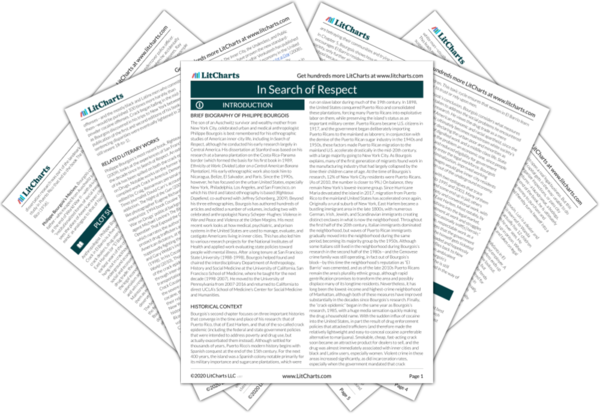Ethnography Quotes in In Search of Respect
In short, how can we expect someone who specializes in mugging elderly persons to provide us with accurate data on his or her income-generating strategies?
The difficulty of relating individual action to political economy, combined with the personally and politically motivated timidity of ethnographers in the United States through the 1970s and 1980s have obfuscated our understanding of the mechanisms and the experiences of oppression I cannot resolve the structure-versus-agency debate; nor can I confidently assuage my own righteous fear that hostile readers will misconstrue my ethnography as “giving the poor a bad name.’’ Nevertheless, I feel it imperative from a personal and ethical perspective, as well as from an analytic and theoretical one, to expose the horrors I witnessed among the people I befriended, without censoring even the goriest details. The depth and overwhelming pain and terror of the experience of poverty and racism in the United States needs to be talked about openly and confronted squarely, even if that makes us uncomfortable.
Furthermore, as the anthropologist Laura Nader stated succinctly in the early 1970 s, “Don’t study the poor and powerless because everything you say about them will be used against them.” I do not know if it is possible for me to present the story of my three and a half years of residence in El Barrio without falling prey to a pornography of violence, or a racist voyeurism — ultimately the problem and the responsibility is also in the eyes of the beholder.
My mistake that night was to try to tell the police officers the truth when they asked me, “What the hell you doin’ hea’h?” When they heard me explain, in what I thought was a polite voice, that I was an anthropologist studying poverty and marginalization, the largest of the two officers in the car exploded:
“What kind of a fuckin’ moron do you think I am. You think I don’t know what you’re doin’? You think I’m stupid? You’re babbling, you fuckin’ drug addict. You’re dirty white scum! Go buy your drugs in a white neighborhood! If you don’t get the hell out of here right now, motherfucka’, you’re gonna hafta repeat your story in the precinct. You want me to take you in? Hunh? . . . Hunh? Answer me motherfucka’!.”
My long-term goal has always been to give something back to the community. When I discussed with Ray and his employees my desire to write a book of life stories “about poverty and marginalization” that might contribute to a more progressive understanding of inner-city problems by mainstream society, they thought I was crazy and treated my concerns about social responsibility with suspicion. In their conception everyone in the world is hustling, and anyone in their right mind would want to write a best seller and make a lot of money. It had not occurred to them that they would ever get anything back from this book project, except maybe a good party on publication day. On several occasions my insistence that there should be a tangible political benefit for the community from my research project spawned humiliating responses.












